Last updated on January 15th, 2024 at 06:54 pm
Coffee's Humble Start
What started as an accidental discovery by a goat herder in Ethiopia[1] has now turned into a drink that millions all over the world regularly depend on, and in different consumption forms, i.e., types of coffee brewing method.
Over time, coffee, the drink, is brewed using different kinds of equipment and methods. Many countries have their own methods coffee brewing the drink with different ratios of liquids and adding flavors. Here is the list that explains the 23 most common types of coffee of brewing methods, flavors, and drinking traditions from hundreds, if not thousands, types of coffee in the world. This list is in alphabetical order for your easy reference.
Here Are the 23 Common Types of Coffee In Alphabetical Order
Common Types of Coffee:
Affogato
An affogato is an Italian indulgence made by pouring a hot espresso shot over a scoop of vanilla ice cream. The intense, punchy espresso combined with creamy, decadent ice cream is a heaven-made match. It can be made with any type of espresso, blonde, ristretto, or even decaf, topped with chocolate, caramel drizzle, or crushed biscotti.
There are more creative ways to make an affogato, such as stacking the ice cream over a brownie or cookie or using different flavors of ice cream, like chocolate, caramel, or many more. However, an affogato-style drink at Starbucks means pouring a hot shot of espresso over a finished blended Frappuccino, which is totally different from its original recipe.
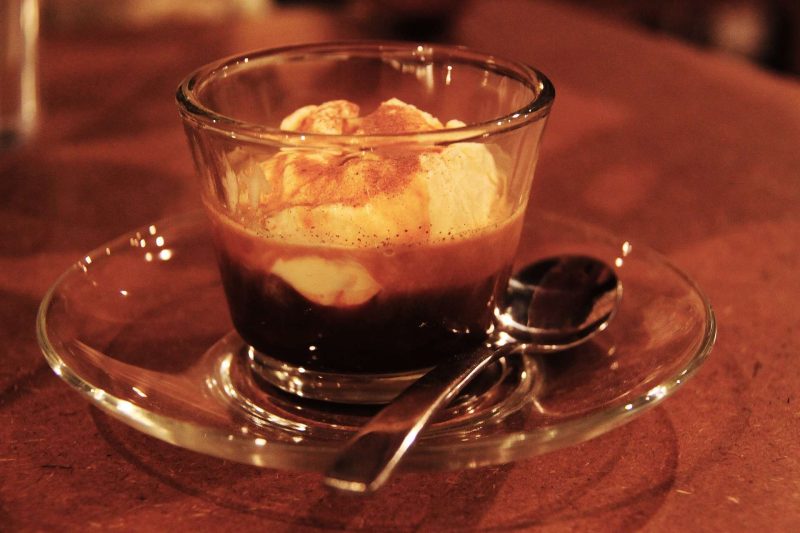
Americano
Americanos are made with espresso, a type of concentrated coffee that requires high water pressure, and dark roast, finely ground beans[2]. Drip coffee is made with a medium-coarse coffee grind mixing slow and low-pressure water intake, thus, drip coffee is milder in flavor and caffeine.
Americanos are sweeter and punchier because the fast-brewing time allows more of the natural flavor compounds to escape dissolving. In hot Americanos, the espresso shot is poured over a mug of hot water, therefore, the first sips are strongest in coffee taste and full of luscious crema for a smooth and full-bodied mouthfeel. The iced Americanos are reversed, and the espresso is poured over ice followed by cold water.

Bulletproof
Dave Asprey, an American computing exec was trekking in the mountains of Tibet to learn meditation from Buddhist pilgrims when a woman served him a local brew: tea mixed with yak butter[3]. In 2010, inspired by this experience, Dave started his company Brain Octane Oil and launched bulletproof coffee, a blend that mixes coffee with butter.
The bulletproof coffee is made with one cup of brewed coffee, 1 to 2 tablespoons of oil, and 1 to 2 tablespoons of unsalted butter or ghee, then blend them till the coffee turns creamy. It is a low-carb and high-fat meal replacement for breakfast. One cup of bulletproof coffee packs in 240 to 350 calories and contains more than the maximum daily recommended intake of saturated fats. With its high calories, anyone can go through the morning without feeling hungry. However, it lacks protein and other essential nutrients for the human body.
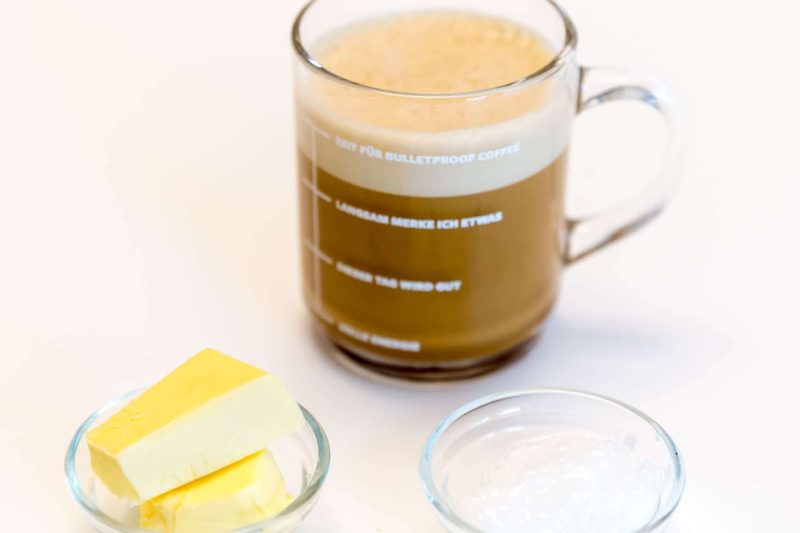
Café au Lait
Cafés au lait is made with French press prepared coffee, either French roast or very dark roast, and steamed milk[4]. There should be equal parts brewed coffee and milk which can be whisked or frothed. This silky beverage is smooth and balanced, with a mild coffee flavor and low caffeine. Café au lait may taste quite plain, so sometimes adding a dash of cinnamon powder can spice up the drink for a tasty experience.

Caffè Breve
Caffè Breve is entirely an American invention. Made with a shot of espresso, steamed half-and-half, and a layer of milk foam, caffè breve has more foam than the average milk-based espresso coffee. Because half-and-half is one-part whole milk and one-part light cream, steaming it and adding it to coffee makes a coffee beverage very rich and creamy. Caffè breve is often served as a dessert instead of a morning pick-me-up.
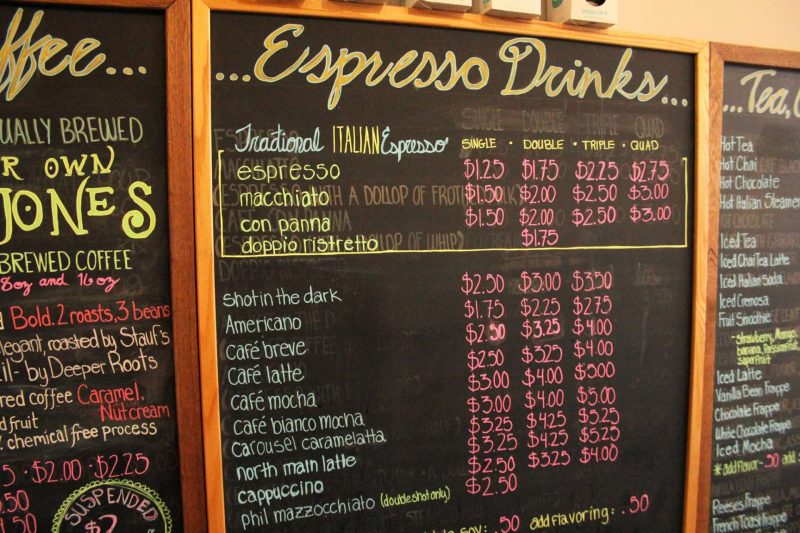
Cappuccino
Cappuccino is an espresso-based java that comes from an Austrian drink called kapuziner. Inspired by the dark color of robes worn by Kapuzin friars of Austria in the 1700s, kapuziner was made with coffee, milk, sugar, and a swirl of whipped cream on top. Today’s cappuccino was concocted by Italians in the 1900s for whom cappuccino was the ideal morning coffee that could be drunk in a handful of gulps for a quick jolt of caffeine[5].
The method of making a cappuccino differs between coffee institutions. Usually, a 1:1:1 ratio of espresso, steamed milk, and foamed milk is followed in the U.S. When brewed by a skilled barista, the steamed milk and milk foam will form layers over the espresso instead of blending into it.
These layers visibly distinguish a cappuccino from other milk-based espresso coffees, such as mocha. Thus, a cappuccino usually tastes more intense than its milky counterparts and highlights the flavor of the coffee beans much better while giving a creamier mouthfeel.
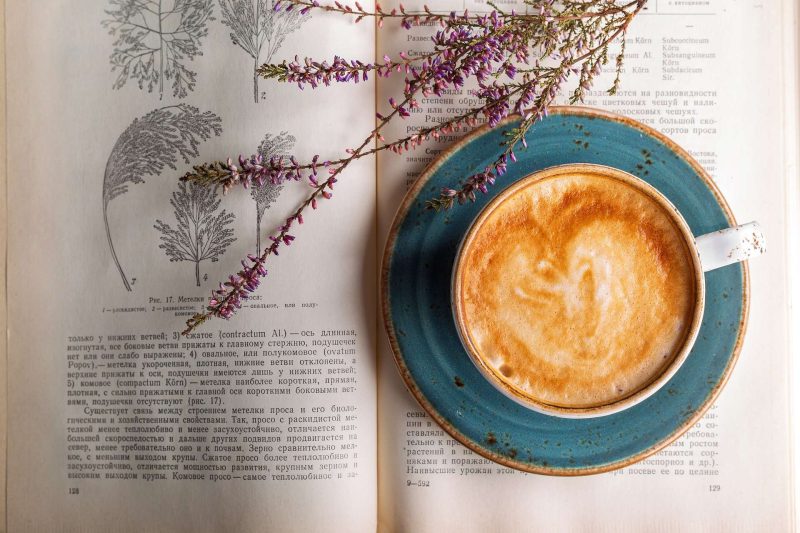
Cold Brew
Cold brew is made by steeping coffee grounds in cold or room-temperature water for at least 12 hours. Over time, the caffeine, oil, and sugar from the grounds seep into the water to produce a refreshing coffee that is smooth in taste. Hot water brings out the acids from a coffee, making it astringent and often requiring milk to undercut the unpleasant flavor[6]. Cold brew is relatively low in acidity and adding milk can make the coffee smoother. Compared to iced coffee requires the use of ice, which melts and dilutes the coffee, cold brew packs the full kick of a coffee without diluting any flavor.
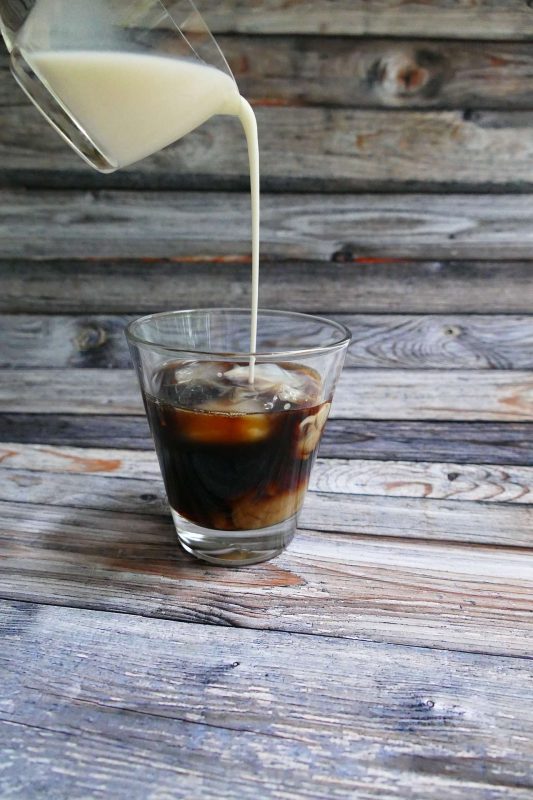
Drip/brewed coffee
The possibilities for drip or brewed coffee are infinite, which could consist of coffeemakers, percolators, pour-overs, or French presses. There are 15 different ways to roast coffee plus numerous ways to change the taste of coffee, including bean grind, water volume, and a drip/brewed coffee can be fun.
Light roast coffee is more acidic and milder, with slightly higher caffeine content compared to other roast methods. Medium and medium-dark roasts are richer and slightly bittersweet, dark roasts are smoky and bold with less caffeine. The recommended method when brewing coffee is two tablespoons of ground coffee per six ounces of water.
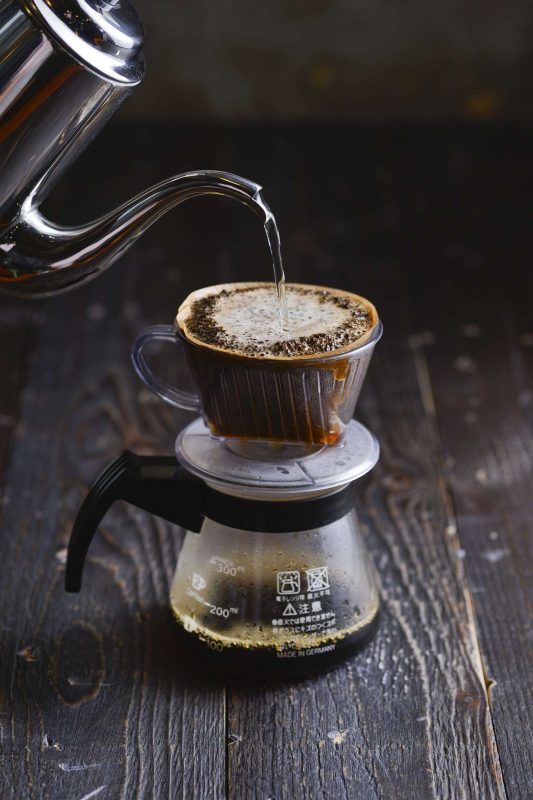
Espresso Con Panna
Espresso con panna is a shot of espresso served with a swirl of whipped cream on top[7]. Espresso con panna might have Turkish heritage, as it is customarily served in the small demitasse cup often used for Turkish coffee. If a person is in need of a quick sweet caffeine kick, a shot of hot espresso with a dollop of whipped cream on top will definitely be a satisfying experience!
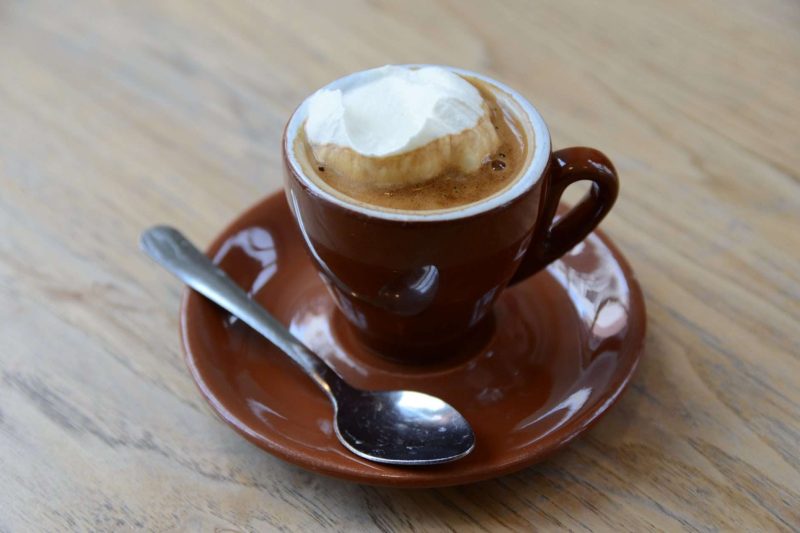
Espresso martini
Made with high-quality espresso and top-shelf vodka, the espresso martini is a smooth, edgy drink perfect for starting a night out or keeping one awake till late at night or early morning[8]. The coffee liqueur, Kahlúa, makes the espresso flavor vibrant and robust, and the syrup helps to keep the espresso martini sweet.
To make the espresso martini, one needs to combine two ounces of vodka, one-half ounce of coffee liqueur, one ounce of espresso, and one-half ounce of simple syrup in a shaker filled with ice. Give it a good shake, then strain the martini into a chilled glass and garnish with coffee beans.
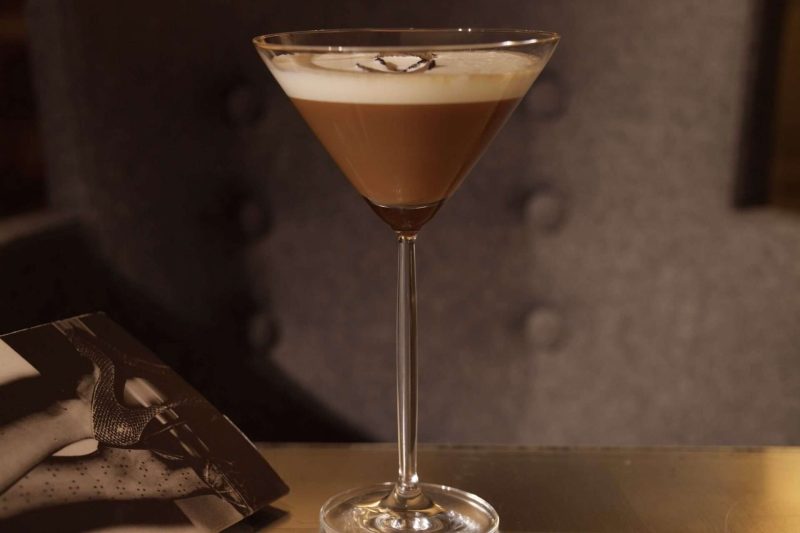
Espresso Romano
Espresso Romano might be invented in the 1950s when Italy was troubled with a coffee shortage due to the limitations posed on the import of beans after the Second World War. Italians started adding lemon to mask the poor quality and inferior flavor of cheap instant coffee sourced from American soldiers.
Nowadays, espresso Romano is a term used for a range of hot, cold, and iced coffees that feature lemon. The citrus flavor can come from lemon slices, lemon juice, or lemon peels. Often, espresso Romano is served as a shot of espresso with sugar and lemon. The sharp citrus intensifies the bold flavors of the espresso while sugar is added to cut the sour flavor of the lemon.
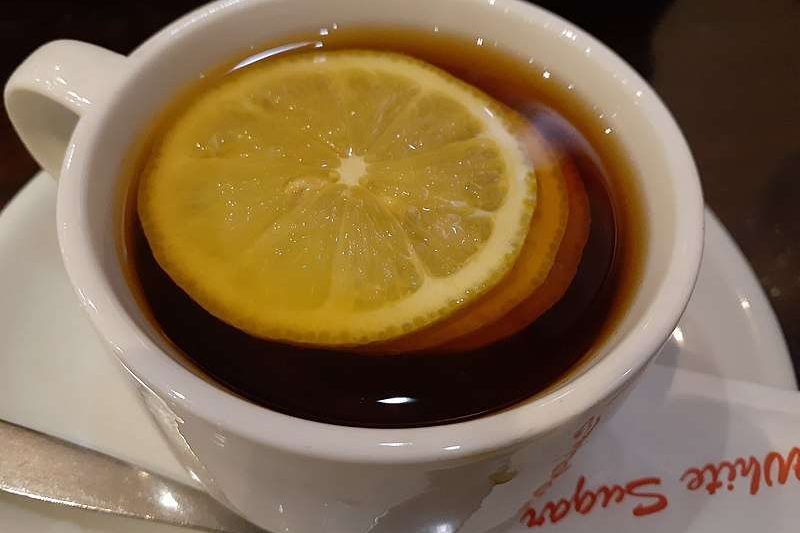
Flat White
A flat white is an espresso-based coffee made with steamed milk and a thin layer of milk foam. It may sound much like a latte, but compared to a latte, a flat white has a higher proportion of espresso to milk. The flat white is usually a 5 oz drink compared to a latte that is 8 oz in size.
Another significant difference between a latte and a flat white is that a latte is made with steamed milk, and a flat white is made with finely textured steamed milk, called micro-foam. This micro-foam milk makes a flat white creamier in texture with a stronger coffee taste than a latte, at the same time a flat white has more liquid than the strong and thick foamed cappuccino.
Frappé
The icy coffee Frappé has become synonymous with summer afternoons by the beach. Legend says that Frappé was accidentally invented by a Greek reporter in the 1950s[9]. However, Starbucks trademarked the Frappuccino, other cafés have to use “frappé” for their ice-blended beverages.
A classic frappé is made with good old Nescafé instant coffee powder, water, and sugar. The mix is either shaken or blended until frothy, then served over ice. One frappé often uses 2 tablespoons of instant coffee powder which means it packs in the punch of four shots of espresso!
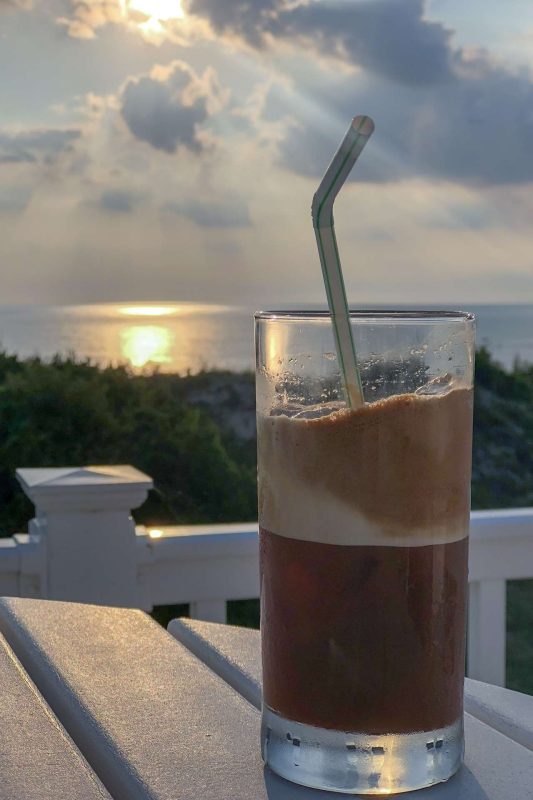
Irish coffee
Irish coffee is a cocktail classic[10]. A proper, delicious Irish coffee, uses two parts fresh-brewed coffee, one part blended Irish whiskey, sugar to one’s desired sweetness, and a thick blanket of runny whipped cream on top. It is the best drink to warm up on a cold dark rainy day.
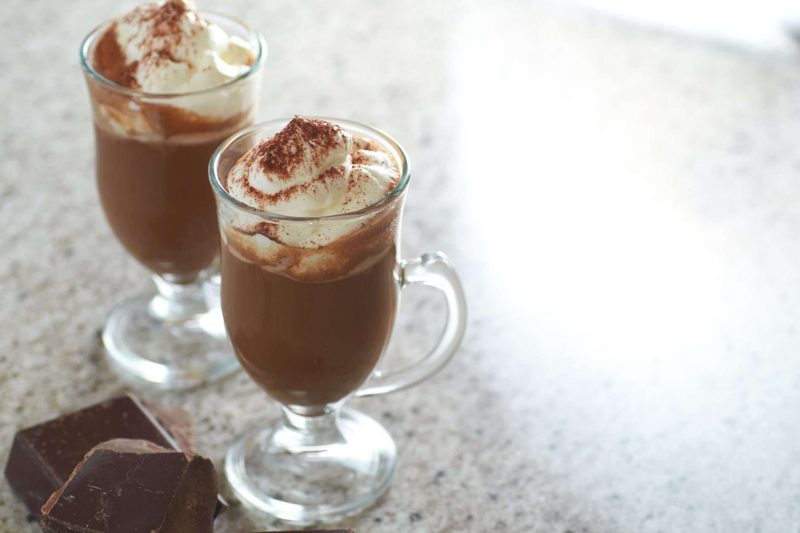
Latte
The caffè latte[11] was invented in 1867 for American tourists in Italy for whom the Italian cappuccino was too strong. Latte is the less intense and considerably milkier version of a cappuccino for not-so-strong coffee-loving Americans.
Usually, a latte is served in a glass and contains mainly espresso and steamed milk with only a thin layer of foam on top.
The high quantity of milk masks the flavor of the espresso, making it a great option for Americans and alike who do not care much about the coffee flavor and only want the coffee for its caffeine punch. The milky taste of a latte with a mild hint of espresso is more popular when adding all sorts of syrups and flavors than any other hot coffee.
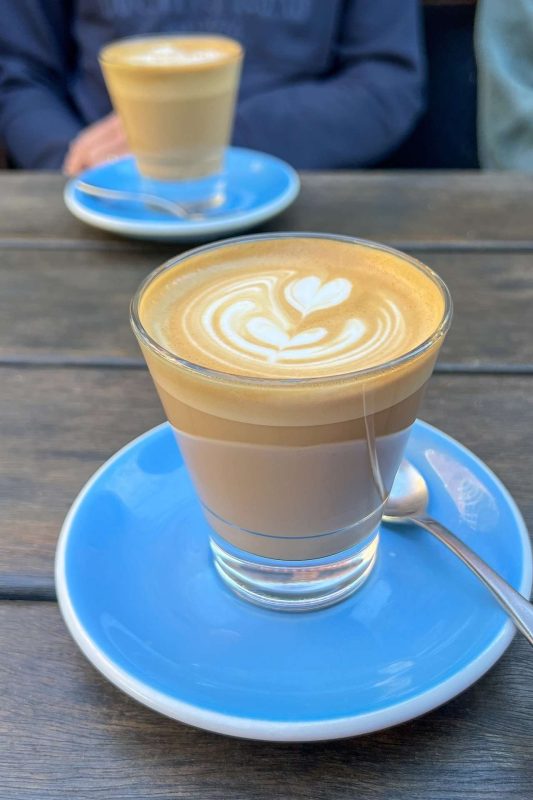
Long Black
To make an Americano, hot water is added to a shot of espresso. To make a long black, a shot of espresso is added to a cup already filled with hot water. This simple difference in preparation claims that a long black has considerably more crema — the layer of froth atop an espresso — than Americano does.
The crema gives the long black a creamier mouthfeel. Usually, a long black also has less water than an Americano and so is more intense and less diluted in comparison. Because long black only requires espresso on top of the water, and a tiny amount of it at that, one can easily taste the subtle flavors of espresso in the drink.
Macchiato
A macchiato is a stronger cappuccino which is a shot of espresso with just a dash of milk to mellow its intensity[12]. A macchiato has the highest ratio of espresso to milk than any other coffee made from the two ingredients, with only a tablespoon or two of foamed milk added to a shot of espresso. It is meant to help power through afternoon slumps.
Macchiato gets its name from the Italian word for stained or marked, so when making a macchiato, just enough milk is added to a shot of espresso to effectively “stain” it, so macchiato is considered an espresso and served in an espresso cup! It is one of the post-meal caffeinated digestives in Italy.
However, there is a completely opposite version of an espresso macchiato, a latte macchiato, which is steamed milk stained with a shot of espresso instead of the other way around.
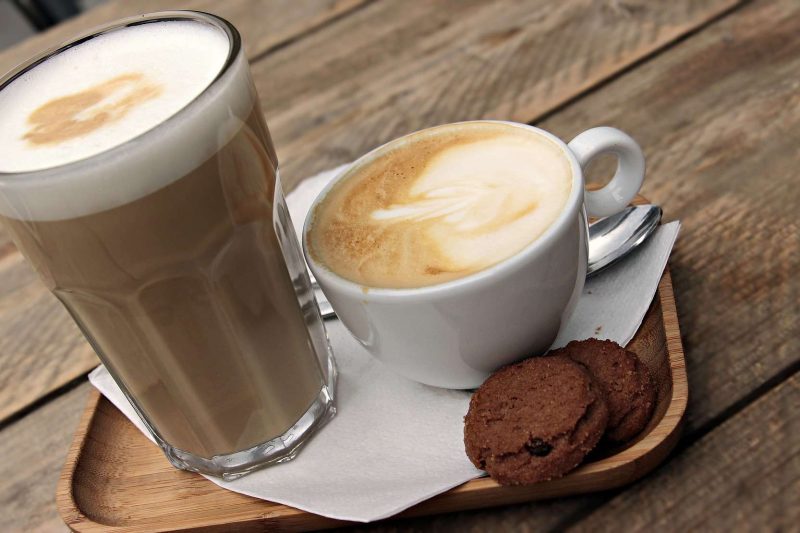
Mocha
Mocha or moka referred to a type of Arabica coffee bean grown in Yemen and was used for coffee beans imported from Yemen’s port of Al Moka[13]. The mocha beans have a green and yellow tint compared to coffee beans from other parts of the world. The mocha beans have a distinct, chocolate-like flavor.
The modern mocha was called after an Italian coffee house by the name of Caffè al Bicerin, which served its customers a beverage of coffee, cream, and chocolate. Today, mocha is made from similar layers of espresso, milk, and chocolate. Mocha is a luscious drink with a mix of milk, chocolate, and coffee!
Nowadays, the exact method by which a mocha is prepared differs between baristas. Sometimes, a single mocha can even have multiple sources of chocolate or different colors of chocolate, dark, milk, or white; and in various forms, including chocolate powder, syrup, and even melted chocolate.
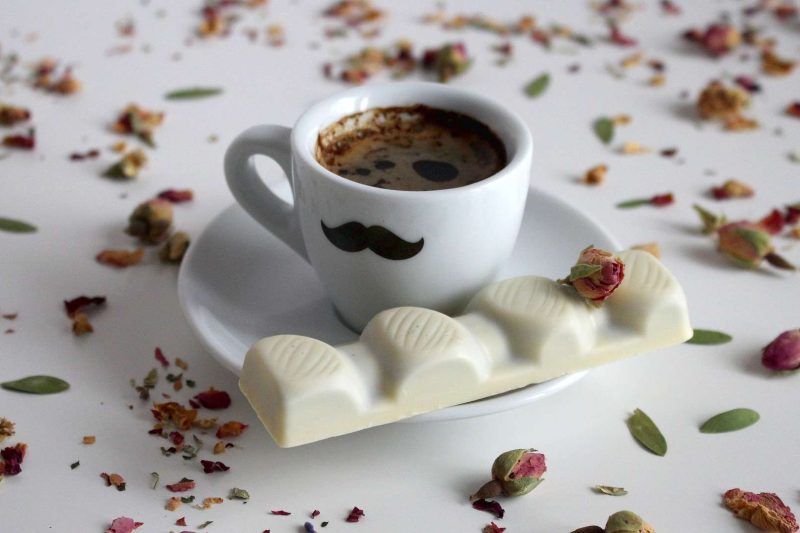
Nitro
To make nitro coffee, nitrogen gas is infused into a cold brew through a pressure valve[14]. While nitrogen has neither any color nor any odor, the gas rids the coffee of all oxygen and so stops its flavor from decomposing while giving the brew a silky texture with lots of tiny bubbles. Nitro coffee has floating layers that swirl about in the glass. With the velvety texture of the small nitrogen bubbles and the cascading effect, nitro is low in acidity.
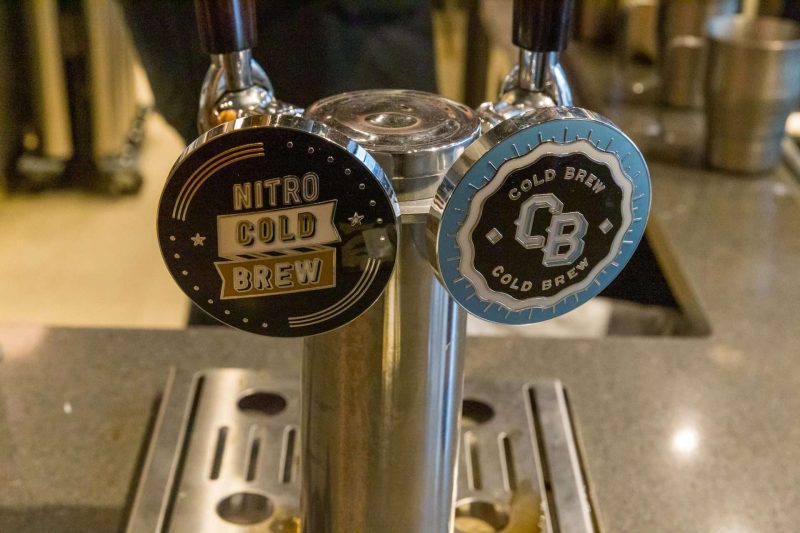
Quad shots
Quad shots are simply four standard shots of espresso, usually made all at once in a larger portafilter. It is usually served over ice in a large cup, and it may be combined with cream or sweetener. However, this coffee does usually lack the crema, or frothy golden head, that forms on hot espresso drinks because of its way of preparation. It is one of the US coffee fanatics’ favorable coffees, especially in Starbucks.
Red Eye
The red-eye coffee is named after a red-eye flight that flies across countries through the night and often leaves travelers with red eyes from exhaustion. The red eye is a very strong coffee drink that combines coffee with more coffee. The drink is basically a cup of regular drip coffee but adds a shot of espresso on top. Compared to an Americano, the taste of a red-eye coffee often has more body.
The red-eye coffee is intense, but the sweet flavor of drip coffee works well with bitter espresso. There are a few stronger versions with the name like “black eye”, “green eye”, or “dead eye”. A black eye uses two espresso shots with its drip coffee, whereas a green eye or dead eye uses three. No matter what color the eyes are, this version of coffee just tries to help one pull through an especially sluggish day or a long all-nighter.
Turkish Coffee
Turkish coffee, or Türk kahvesi, is brewed in a unique metal pot with a long handle called a cezve[15]. Instead of a flame or an electric machine, the coffee is left to boil in the cezve over hot sand till it just about spills and is then served in a standard-sized cup. Usually, a lokum, a Turkish delight, accompanies the coffee, along with a glass of water to ready the palate for the strong coffee. A frothy Turkish coffee is served unfiltered, there are usually a good amount of coffee grounds at the bottom of the cup which one should not consume.
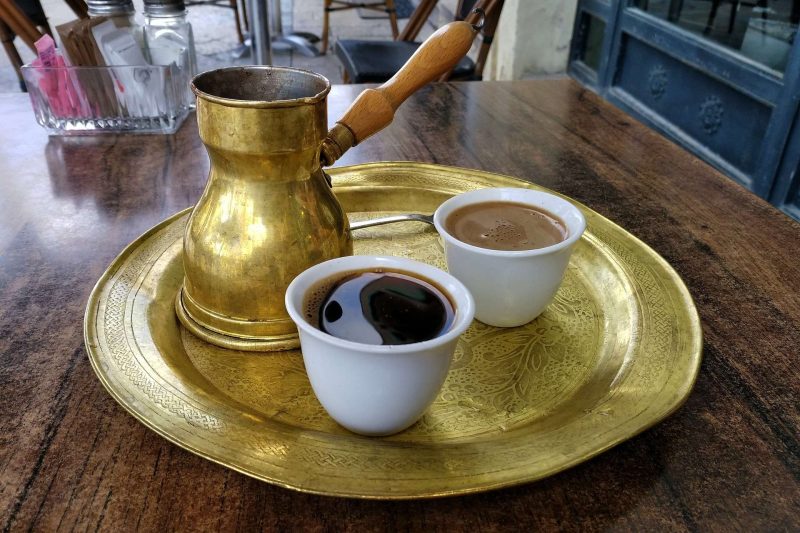
Vienna Coffee
Served in a tall-handled eight-ounce glass, a Vienna coffee is made by pouring one or two shots of espresso into the glass and adding around an ounce of hot water, then, filling the remaining space with whipped cream[16]. The topping of a Vienna coffee is usually chocolate shavings, but other alternative toppings can be used instead, such as chocolate curls, sprinkles, cocoa powder, chocolate syrup, or even orange zest and almond slivers.

Coffe Trivia Quiz 03
Test Your Knowledge About Coffee
Question
Your answer:
Correct answer:
Please wait..
↺Your Answers
Keep In Touch If You Like My Articles.
You may be interested in learning some of these coffee recipes that you can make at home: 30 Delicious Hot Coffee Recipes That Coffee Lovers Can Make At Home Easily, or, 15 Delicious Iced Coffee Recipes That Coffee Aficionados Can Easily Make At Home.
If you have any suggestions, questions, or comments, please submit them either at the bottom of this post or through our Contact page form. Also, don’t forget to subscribe to our quarterly newsletters if you like to keep in touch. Here are more blogs if you like to know more about coffee, such as “High-Caffeine K-Cups“.
It’s really a great and helpful piece of info. I’m glad that you shared this helpful info with us. Please keep us up to date like this. Thanks for sharing.
It’s hard to find knowledgeable people on this topic, but you sound like you know what you’re talking about! Thanks
hello!,I really like your writing so so much! share we keep up a correspondence more about your post on AOL? I need an expert in this house to unravel my problem. May be that’s you! Looking ahead to peer you.
Pretty section of content. I simply stumbled upon your web site and in accession capital to claim that I acquire in fact enjoyed account your blog posts. Anyway I’ll be subscribing to your augment or even I achievement you access consistently rapidly.